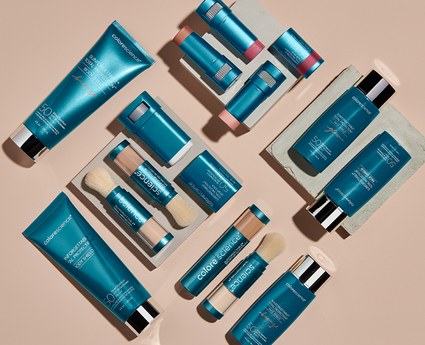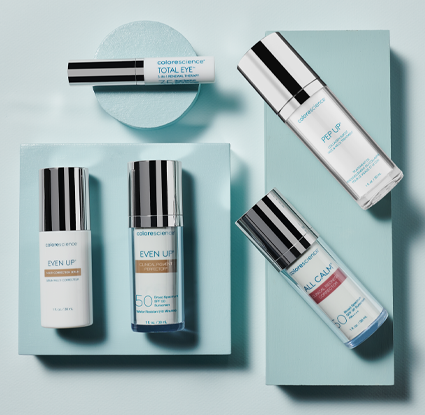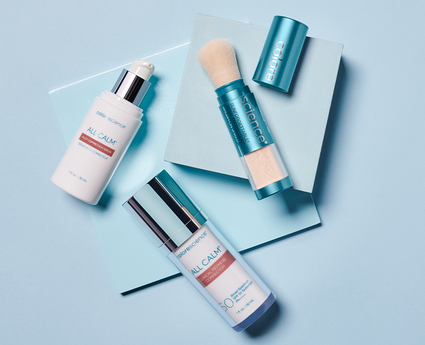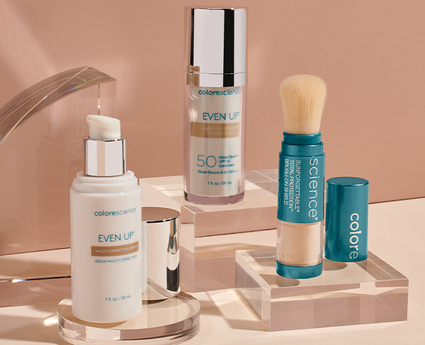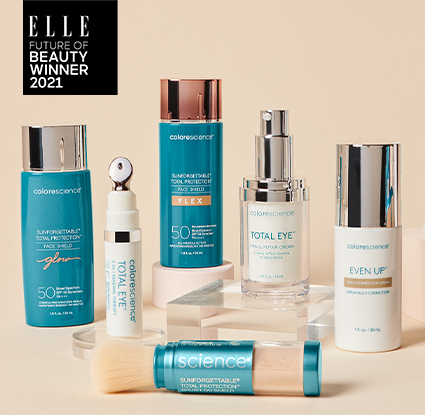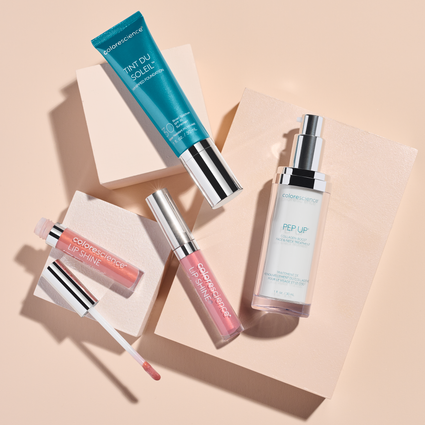5 Signs of Sensitive Skin & What to Do About It
Having healthy, happy skin is vital to your overall health, wellness, and happiness. That is why we work so hard to help you take the best care of it as you possibly can. But we know that it isn’t always easy, and outside factors can contribute to the degeneration of your skin cells, cause wrinkles, and lead to annoying irritations. Plus, add sensitive skin on top of all of those factors, and you are set up for skin nightmares.
Though having skin sensitivity is no fun, it’s actually more common than you think. Approximately 70% of people consider themselves to have sensitive skin. That means that tons of research has been done and data has been gathered to ensure you there are solutions for caring for and protecting your sensitive skin.
In this blog post we will help you to identify what sensitive skin looks like (redness, dry patches, itching, etc.), educate you on why your skin could be having sensitives, and what you can do to help soothe your sensitive skin and find relief while protecting it, too. So, let’s dive in and get to the bottom of your sensitive skin woes.
- 5 Signs of Having Sensitive Skin
- What Causes Sensitive Skin
- Should You Be Worried If You Notice Signs of Having Sensitive Skin?
- What Can You Do About Sensitive Skin?
- Get Help from a Dermatologist
- Find Relief & Protect Your Sensitive Skin
5 Signs of Having Sensitive Skin
You have most likely heard about others experiencing signs of sensitive skin, or you have experienced it yourself. But what does that mean, exactly? What is it that is happening to your skin? Well, there could be a few factors causing it, but before we dive into the whys behind sensitive skin, lets cover what it looks like.

Because of how common skin sensitivity is, it’s easy to identify the signs once you know what to look for. And when you’re able to identify that you too are struggling with sensitive skin, you are closer to being able to remedy it—including taking the proper steps toward working on a regimen to protect, heal, and soothe your skin.
So, what are the symptoms of sensitive skin? There are quite a few obvious signs of sensitive skin, but here are some of the most common:
- Redness
- Dry patches
- Itching
- Rashes
- Prone to sunburns
- Tightness
Keep reading to figure out how to properly identify what each of these signs of sensitive skin looks like.
1. Redness
When experiencing redness with sensitive skin, the skin will flush and get rosy in color. Though getting red in the face can be common due to heat, embarrassment, excitement, or changes in your body, redness with sensitivity doesn’t go away quickly like it does when it is caused by a temporary emotion, warm environment, or even while pregnant. Lingering redness might be a sign of sensitive skin.
2. Dry Patches
Dry skin is flaky, irritating, and uncomfortable. If you notice that you are experiencing dry patches on your face, elbows, armpits, or other areas of thin skin, it may be due to sensitivity.
3. Itching
Though itching can be caused by quite a few factors, you don’t want to rule out a general skin sensitivity. When introducing new products like lotions, sunscreen, or serums, you want to keep a close eye on things to see if you notice yourself itching more than usual.
4. Rashes
Rashes are a common side effect of sensitive skin. But it’s good to know that sensitive skin rashes aren’t always what they seem. They could be beyond irritation, and can call for medical treatment. Atopic dermatitis, also known as eczema, is a non-contagious skin rash that can cause dry, itchy skin.

5. Tightness
Tight skin can mean that your diet is enriched with foods that firm your skin, or it can mean that it is sensitive, unable to absorb moisture, and will be tougher to take care of.
Though we have named five signs of sensitive skin, that doesn’t mean it stops here. If you are experiencing any other signs that you have sensitive skin or see any abnormalities, you may want to contact your doctor or dermatologist.
What Causes Sensitive Skin
You may think that signs of sensitive skin happen over time, or for unknown reasons, but there are actually a handful of reasons that sensitive skin occurs for most people. Though it could be any of the following recognized medical causes, it’s good to keep an open mind and not self-diagnose. When trying to remedy the skin issues, it’s a good idea to try to find out what’s causing it as soon as possible. That way, you’re not stuck living with discomfort or accidentally exacerbating the problem.
Two of the main causes of sensitive skin is allergic contact dermatitis and irritant contact dermatitis.
- Irritant contact dermatitis, means it is a reaction to an external agent, and not an allergy. This can occur due to:
- Wet work: Jobs that expose your skin to chemicals and water frequently causing irritation.
- Environmental factors: Heat, cold, or ultraviolet light.
- Friction: Gloved working hands, chaffed or chapped skin, etc.
- Allergic contact dermatitis is the reaction your sensitive skin can have because of an allergy. Say you are to touch an allergen (botanicals, fragrances, food allergens), or an irritant (chemicals, harsh soaps, resins and epoxies), you will start to see signs of sensitive skin popping up on the affected areas.
Is Sensitive Skin a Sign of Early Pregnancy?
Each body is different, and when it comes to pregnancy, it can have unique effects on your body. If you are starting to see signs of sensitive skin, and you have been trying to conceive, there may be a chance that you are a step closer to starting or adding to your family. About 1 in 5 pregnant women experience changes to their skin while they are pregnant. So, while it isn’t the only sign that you may be expecting, it could indeed give you an insight to your future.
Should You Be Worried If You Notice Signs of Having Sensitive Skin?
One of the most important things to remember when you experience any sort of change to your skin or your health, is that you don’t want to panic. Your natural instinct is going to be to worry, but panicking is not necessary, nor will it help you to heal. Stress might even make it worse.
If you feel that you come across skin conditions that show signs of serious sensitivity and irritation, you should seek medical help as soon as possible. We can help you with questions like can you use body sunscreen on your face and what sunscreen ingredients to avoid, but for cases of extreme irritation and sensitivity, seeing your medical professional is the safest thing you can do. They can diagnose your symptoms and get you on a regimen to help improve your sensitive skin.

What Can You Do About Sensitive Skin?
Just like there are quite a few factors that can cause you to start showing signs of sensitive skin, there are also quite a few options to help you remedy, soothe, or work toward healing sensitive skin. Keep reading to find out a few ideas of what to do when it comes to caring for skin sensitivities.
Use Skincare Made for Sensitive Skin
One of the best ways you can help your sensitive skin return to normal, is to properly take care of your skin with gentle skincare products. This means products without chemicals or fragrances, or even those specially formulated for those with sensitive skin.
At Colorescience we’re dedicated to creating natural, mineral-based skincare options that are safe for sensitive skin and some of which cater specifically to the problems that those with skin sensitivities face. For example, our All Calm Multi-Correction Serum helps with redness and calming when your skin is irritated. Our calming primer can help balance out redness while also providing the usual benefits of a good primer.
It’s important to note that sensitive skin can also be more prone to sunburns. With skin that’s sensitive to sun exposure, you may experience itching and rashes when you spend too long outdoors. With that being the case, you should prioritize protecting yourself. Sunscreen can help you protect your skin from sun up to sun down, and should be applied frequently and liberally. Not only can it help to keep your sensitive skin protected and irritant free, sunscreen can help with acne, keep away fine lines and wrinkles, and help you to maintain healthy skin overall.

Our mineral sunscreens are chemical-free and defend against environmental stressors, making taking care of your sensitive skin easier than ever before. Don’t suffer unnecessarily anymore, now that you have some options, you can get started on a new sensitive skin skincare regime today.
Make Changes to Your Lifestyle
Making small changes to your lifestyle can really add up to having a positive impact on your skin, including helping to reduce symptoms of sensitive skin. Here are a few ideas of what changes you can make to reduce the signs of sensitive skin on your face, arms, and anywhere else on your body:
- Start using a gentle cleanser
- Always wear sunscreen
- Avoid things you are allergic to
- Stay out of the sun as much as possible
- Wear clothes that are made to protect your skin when outdoors
- Take note of what you eat and how it affects your skin
This is not an exhaustive list, and what works for others may not always be what works best for you. Take your time to find what helps reduce or eliminate your symptoms.
Get Help from a Dermatologist
Getting professional medical help from a dermatologist can be a real game changer for those that show signs of having sensitive skin. Dermatologists can test the skin and can work hard to check for any potential allergies that you may have, or underlying conditions that can be contributing to sensitive skin. Don’t wait until your skin is suffering to get help.
Find Relief & Protect Your Sensitive Skin
Now that you know what sensitive skin looks like, some of the causes, and what you can do to help it, you want to be sure you are following through with it. At the end of the day, if you are noticing signs of sensitive skin, it is time to start implementing some changes to your skincare regime, getting help from your dermatologist, and making lifestyle changes.
Colorescience is here for you as you work on getting sensitive under control. Try our mineral-based sunscreen and skincare to help you find relief and keep your skin healthy and glowing.

